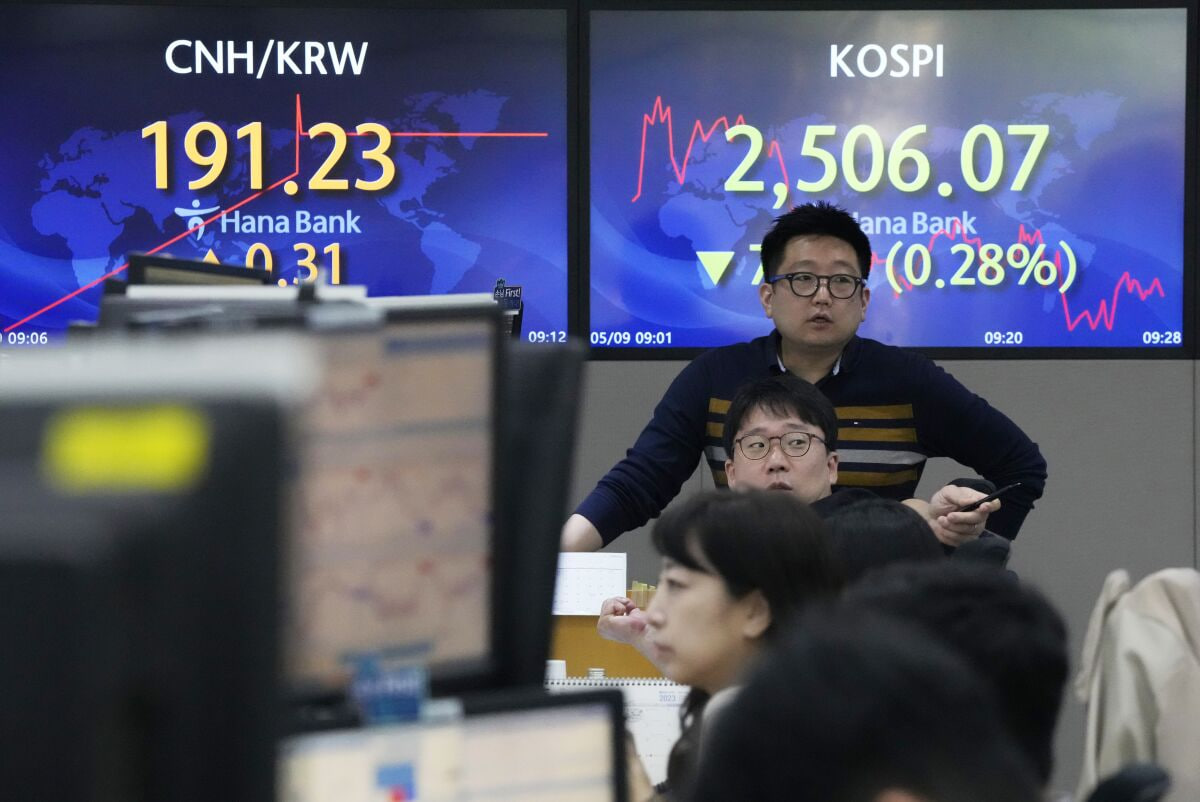Decoding the Hong Kong Stock Market Dip: A Deep Dive into the Recent Baidu Slump and its Implications (Meta description: Hong Kong Stock Market, Hang Seng Index, Hang Seng Tech Index, Baidu Stock, Stock Market Analysis, Investment Strategy, Market Volatility)
Dive headfirst into the captivating world of Hong Kong stock market dynamics! The recent dip in the Hang Seng Index and the Hang Seng Tech Index, punctuated by a significant fall in Baidu's stock price, has sent ripples through the investment community. It’s not just numbers on a screen; it's about real people, real money, and real anxieties. This isn't your grandpa's dry market report; we're going deep, exploring the underlying reasons for this market movement, dissecting the potential implications, and offering actionable insights you can use to navigate this volatile landscape. Forget the jargon-filled, corporate-speak analyses – we're here to give you the straight goods, seasoned with real-world experience and a dash of humor. We'll explore the factors that influenced this downturn, ranging from macroeconomic headwinds to specific company performance, providing a comprehensive overview that goes beyond the headline news. Buckle up, because we're about to unravel the mystery behind Baidu's stumble and what it means for your investment portfolio. Whether you're a seasoned investor or just starting your journey in the financial markets, this in-depth analysis will provide valuable insights and equip you with the knowledge to make informed decisions. We'll also equip you with strategies to mitigate risk and potentially capitalize on opportunities presented by market fluctuations. Let's get started!
Hang Seng Index and Baidu's Recent Performance
The recent downturn in the Hong Kong stock market, as indicated by the dip in the Hang Seng Index (HSI) and the Hang Seng Tech Index (HSTI), has understandably caused concern among investors. The opening figures – a 0.59% drop for the HSI and a 0.61% fall for the HSTI – paint a picture of market uncertainty. Adding fuel to the fire, Baidu (BIDU), a tech giant heavily weighted in the HSTI, experienced a significant drop exceeding 2%. This isn't just a minor blip; it reflects a broader market sentiment shift that needs careful consideration. What triggered this decline? Was it a confluence of factors, or is there a single, dominant cause? Let's unpack the possible contributing elements.
This drop wasn't entirely unexpected. Market analysts have been pointing to several potential catalysts for some time, ranging from global economic slowdown fears to specific regulatory changes affecting the tech sector in China. The interconnectedness of global markets means that events in one region can quickly ripple across the globe, influencing investor sentiment and asset prices. Remember the domino effect? That's precisely what we're seeing in action here. The interconnectedness is a double-edged sword – it can amplify both gains and losses.
Macroeconomic Factors at Play
One cannot ignore the influence of global macroeconomic factors. The ongoing concerns about inflation, rising interest rates, and potential recessions in major economies cast a long shadow over market confidence. Investors tend to become more risk-averse during such periods, leading to capital flight from riskier assets like tech stocks. This risk-off sentiment has undoubtedly played a role in the recent downturn. It's like a game of musical chairs – when the music stops, everyone scrambles for a seat, and some inevitably get left out.
Regulatory Scrutiny and its Impact
The Chinese government's ongoing regulatory scrutiny of its tech sector has also contributed to the volatility. Increased regulatory pressure can create uncertainty, making investors hesitant to commit large sums of money. This hesitancy leads to price corrections like the one observed in Baidu's stock. It's a delicate balancing act for companies operating within a dynamic regulatory environment. Navigating these regulatory waters demands adaptability and foresight. This isn't just about compliance; it's about understanding the nuances of the regulatory landscape and anticipating future changes.
Baidu's Specific Challenges
While macroeconomic factors and regulatory pressures play a significant role, it's crucial to analyze Baidu's specific challenges. Perhaps there were unforeseen operational issues, a disappointing earnings report, or negative news related to the company's products or services. A thorough examination of Baidu's recent announcements and financial performance is essential to understand the depth of the problem. It's not enough to simply look at the stock price; we need to delve into the company's fundamentals to get a complete picture. This is where rigorous due diligence comes into play.
Navigating Market Volatility: Strategies for Investors
The recent market volatility highlights the importance of a robust investment strategy. Diversification is key – don't put all your eggs in one basket. Spreading your investments across different asset classes and sectors can help mitigate the impact of market downturns. Moreover, a long-term perspective is crucial. Short-term market fluctuations are inevitable; focus on the long-term growth potential of your investments. Don't panic-sell during downturns; instead, use such periods to re-evaluate your portfolio and identify potential opportunities. Remember, every market correction presents a chance to buy low and sell high – provided you have the nerve and the knowledge. Don't let fear dictate your actions.
Understanding the Impact of Baidu's Decline
Baidu's decline isn't an isolated incident; it reflects wider concerns about the Chinese tech sector. The company's significant presence in the HSTI makes its performance a crucial indicator of the overall market health. This makes understanding Baidu's challenges and prospects critical for investors interested in the Hong Kong market.
Analyzing Baidu's Fundamentals
To accurately assess the impact of Baidu's decline, it's vital to analyze its financial statements, growth trajectory, and competitive landscape. A detailed SWOT (Strengths, Weaknesses, Opportunities, and Threats) analysis can provide a comprehensive understanding of the company's position. This is where fundamental analysis becomes indispensable. This involves not just looking at the numbers but also understanding the underlying business model, competitive advantages, and future growth prospects. It’s time to roll up your sleeves and get into the nitty-gritty.
Long-Term vs. Short-Term Perspective
The temptation to focus on short-term gains is strong, but a long-term perspective is more prudent. Markets fluctuate; this is a given. Consider Baidu's long-term growth potential and its strategic initiatives. Has the company's core business model fundamentally changed? Are there new opportunities on the horizon? Looking beyond the immediate dip is key to making informed investment decisions. The long-term prospects might outweigh the short-term volatility.
Frequently Asked Questions (FAQs)
Q1: Is this the start of a major market crash?
A1: It's too early to tell. While the recent dip is significant, it's not necessarily indicative of a broader market crash. Market corrections are a normal part of the cycle, and a deeper analysis is needed to determine the extent of this downturn.
Q2: Should I sell my Baidu shares?
A2: This depends entirely on your investment strategy and risk tolerance. If you have a long-term investment horizon and believe in Baidu's future prospects, holding onto your shares might be a viable option. However, if you're risk-averse, you might consider diversifying your portfolio.
Q3: How can I mitigate the risks associated with investing in the Hong Kong market?
A3: Diversification is key. Spread your investments across different asset classes and sectors to reduce your exposure to any single area. Thorough research and due diligence are also crucial.
Q4: What are the potential opportunities arising from this market correction?
A4: Market corrections often present opportunities to buy undervalued assets at lower prices. This is a chance for long-term investors to acquire quality assets at attractive valuations.
Q5: Where can I find reliable information about the Hong Kong stock market?
A5: Reputable financial news sources, market analysis websites, and financial advisors can provide valuable insights. Always cross-reference information from multiple sources.
Q6: Should I invest in the Hong Kong market right now?
A6: The decision to invest in the Hong Kong market depends on your risk tolerance, investment goals, and market outlook. Thorough research and consultation with a financial advisor are recommended before making any investment decisions.
Conclusion
The recent dip in the Hong Kong stock market, particularly Baidu's decline, underscores the inherent volatility of the market. However, it also presents opportunities for discerning investors. By understanding the underlying factors driving market movements and employing a robust investment strategy, investors can navigate this volatile landscape effectively. Remember, thorough research, diversification, and a long-term perspective are crucial for success in any market. Don't be swayed by short-term fluctuations; focus on the bigger picture, and you'll be well-positioned to weather any storm. The market is never static; adapt, learn, and grow. Good luck!



